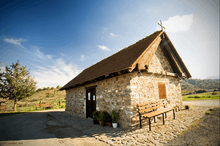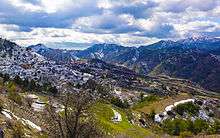Troodos Mountains
Troodos (sometimes spelled Troödos; Greek: Τρόοδος [ˈtɾooðos]; Turkish: Trodos Dağları) is the largest mountain range in Cyprus, located in roughly the center of the island. Troodos' highest peak is Mount Olympus at 1,952 meters, which hosts four ski slopes. The Troodos mountain range stretches across most of the western side of Cyprus. There are many famous mountain resorts, Byzantine monasteries and churches on mountain peaks, and nestling in its valleys and picturesque mountains are villages clinging to terraced hill slopes. The area has been known since antiquity for its mines, which for centuries supplied copper to the entire Mediterranean. In the Byzantine period it became a great centre of Byzantine art, as churches and monasteries were built in the mountains, away from the threatened coastline.
The mountains are also home to RAF Troodos, a listening post for the NSA and GCHQ.[1]
Geology of Troodos
_-_TIMEA.jpg)

The Troodos mountains are known worldwide for their geology and the presence of an undisturbed ophiolite sequence, the Troodos Ophiolite. These mountains slowly rose from the sea due to the collision of the African and European tectonic plates, a process that eventually formed the island of Cyprus. The slowing and near-cessation of this process left the rock formations near intact, while subsequent erosion uncovered the magma chamber underneath the mountain, allowing a viewing of intact rocks and petrified pillow lava formed millions of years ago, an excellent example of ophiolite stratigraphy. The observations of the Troodos ophiolite by Ian Graham Gass and co-workers was one of the key points that led to the theory of sea floor spreading.
Climate
| Climate data for Prodromos in Troodos Mountains, elevation: 1380 m (Satellite view) | |||||||||||||
|---|---|---|---|---|---|---|---|---|---|---|---|---|---|
| Month | Jan | Feb | Mar | Apr | May | Jun | Jul | Aug | Sep | Oct | Nov | Dec | Year |
| Mean maximum °C (°F) | 13.3 (55.9) |
13.9 (57) |
18.5 (65.3) |
24.7 (76.5) |
27.9 (82.2) |
30.6 (87.1) |
32.2 (90) |
32.2 (90) |
30.2 (86.4) |
26.6 (79.9) |
20.1 (68.2) |
14.3 (57.7) |
23.7 (74.7) |
| Average high °C (°F) | 6.3 (43.3) |
6.6 (43.9) |
10.3 (50.5) |
15.1 (59.2) |
20.5 (68.9) |
25.0 (77) |
28.1 (82.6) |
27.9 (82.2) |
24.4 (75.9) |
19.6 (67.3) |
12.8 (55) |
8.0 (46.4) |
17.1 (62.8) |
| Daily mean °C (°F) | 3.5 (38.3) |
3.5 (38.3) |
6.6 (43.9) |
10.7 (51.3) |
15.8 (60.4) |
20.1 (68.2) |
23.3 (73.9) |
23.1 (73.6) |
19.6 (67.3) |
15.4 (59.7) |
9.5 (49.1) |
5.3 (41.5) |
13.0 (55.4) |
| Average low °C (°F) | 0.7 (33.3) |
0.3 (32.5) |
2.8 (37) |
6.3 (43.3) |
11.1 (52) |
15.2 (59.4) |
18.4 (65.1) |
18.2 (64.8) |
14.9 (58.8) |
11.3 (52.3) |
6.2 (43.2) |
2.5 (36.5) |
9.0 (48.2) |
| Mean minimum °C (°F) | −4.5 (23.9) |
−5.2 (22.6) |
−2.6 (27.3) |
0.5 (32.9) |
4.7 (40.5) |
9.2 (48.6) |
13.5 (56.3) |
14.0 (57.2) |
10.1 (50.2) |
5.4 (41.7) |
0.1 (32.2) |
−2.8 (27) |
3.5 (38.3) |
| Average precipitation mm (inches) | 133.4 (5.252) |
123.6 (4.866) |
82.3 (3.24) |
56.9 (2.24) |
26.0 (1.024) |
40.0 (1.575) |
12.1 (0.476) |
10.0 (0.394) |
9.5 (0.374) |
24.0 (0.945) |
102.5 (4.035) |
169.7 (6.681) |
790.1 (31.106) |
| Average precipitation days (≥ 1 mm) | 12.4 | 11.2 | 9.8 | 6.7 | 3.7 | 2.1 | 0.7 | 0.7 | 1.4 | 3.5 | 7.4 | 11.2 | 70.7 |
| Mean monthly sunshine hours | 130.2 | 150.8 | 195.3 | 231.0 | 275.9 | 315.0 | 328.6 | 310.0 | 255.0 | 220.1 | 165.0 | 136.4 | 2,713.3 |
| Source: Meteorological Service (Cyprus)[2] | |||||||||||||
Churches

The region is known for its many Byzantine churches and monasteries, richly decorated with murals, of which the Kykkos monastery is the richest and most famous. Nine churches and one monastery in Troodos together form a World Heritage Site, originally inscribed on the World Heritage List by UNESCO in 1985. The nine Byzantine churches are:
- Stavros tou Ayiasmati
- Panayia tou Araka
- Timiou Stavrou at Pelendri
- Ayios Nikolaos tis Stegis
- Panayia Podithou
- Assinou
- Ayios loannis Lampadistis at Kalopanayiotis
- Panayia tou Moutoula
- Archangel Michael at Pedoulas
- Transfiguration of the Saviour Palaichori
- Church in spring
Villages of Troodos (selection)
Gallery
- January in Troodos
 Young tree in Winter
Young tree in Winter.jpg) Troodos Mountains
Troodos Mountains- Lazanias village
 Troodos has many of the oldest trees in the world
Troodos has many of the oldest trees in the world- Forests in Troodos Mountains
 Pinus brutia, foothills of Troodos Mountains
Pinus brutia, foothills of Troodos Mountains River tributary in Troodos
River tributary in Troodos Parakentro is a non-profit cultural centre in Lemythou village
Parakentro is a non-profit cultural centre in Lemythou village- Millomeris Waterfall, Platres
- Milia Bridge, Platres
- Kalidonia Waterfall, Platres
- Part of Troodos Mountains.
 View of Farmakas region
View of Farmakas region Prodromos in winter
Prodromos in winter.jpg) Road through the forest
Road through the forest
See also
References
- ↑ Spies in the sky, by Cora Currier and Henrik Moltke, The Intercept_, January 29, 2016
- ↑ "Climatological and Meteorological Reports - Prodromos - 1991 - 2005" (PDF). Archived from the original (pdf) on 2016-03-27. Retrieved 2017-06-29.
External links
- Official Website by the Cyprus Tourism Organisation
- Troodos (General Area) Museums
- Panoramic virtual tour of the Troodos Mountains
- Kypros Net article on Troodos
- Awarded "EDEN - European Destinations of Excellence" non traditional tourist destination 2007
Coordinates: 34°55′N 32°50′E / 34.917°N 32.833°E
